|
Chianti Crime Fest
I am grateful to my young understudy Jake Kerridge for providing such an interesting (not too interesting, I hope) column last month. Normal service has now been resumed, after what was an invigorating summer organising the first Chianti Crime Fest so generously sponsored by the Chianti producers of Tuscany. A collection of the formal papers presented will appear in due course, but for now a brief report of proceedings will have to suffice.
It was a great honour to lead the opening session – on British crime writing – with Baroness Cohen of Pimlico, who writes as Janet Neel, and to be joined on a video link by Italian government minister Mariastella Gelmini, a close associate of the Festival’s patron Don Silvio, who was unavoidably called away just as the event began.

Leading for the home team, so to speak, at another venue was the multi-talented Ben (Verbena) Pastor, a professional archaeologist and also writer of fine historical thrillers, who was interviewed by Italian crime fiction guru Luca Crovi.
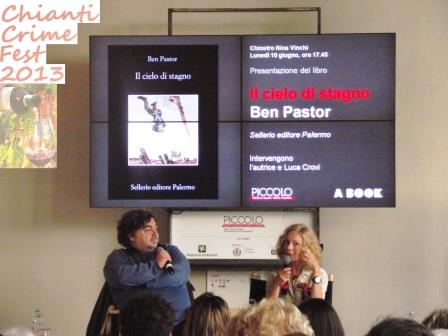
And in the best Anglo-Italian tradition, the writing duo behind the pen-name Michael Gregorio (Michael Jacob and Daniela De Gregorio) were interviewed by Jadal Andreetto on their latest book set in contemporary Italy before they themselves turned, in philosophical mood, to interviewing British author Roger Morris.
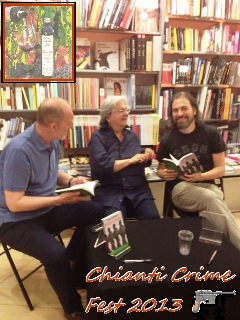
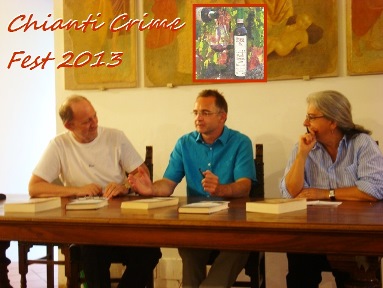
Local booksellers also played their part, displaying the range of crime fiction now available in translation in Italy and, naturally, the summer’s big best bestseller in the Florence region.
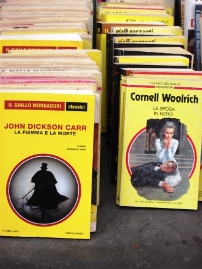 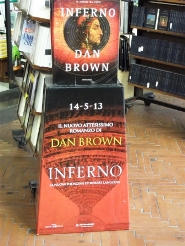
No report of the Festival would be complete, however, without some mention of the social side and in particular the contribution of Ben Pastor (I told you she was talented), who led the last night sing-along and Mario Camerone, renowned chef (and famous musician) who catered brilliantly to the needs of hungry delegates.
 
The first Chianti Crime Fest was an undoubted success and bookings are already being taken for next year’s event, assuming that our sponsors, the Chianti producers of Tuscany, can replenish their severely depleted supplies by then. But I cannot sign off on Italy without sharing my latest discovery, the new policier by Michele Giuttari, The Dark Heart of Florence, which is already out here from Little, Brown.

Giuttari is a good crime writer – and has a pair of good translators – but he is also a man who has no excuse for getting things wrong, as he is a former head of the Florence Police Force. Dark Heart is an excellent police thriller with a truly wonderful setting. I mean, however dark and corrupt things get, how could a thriller set in Florence be anything but enchanting…?
Farewell, Dutch
I was distraught to hear of the death of Elmore ‘Dutch’ Leonard at the age of 87, from complications following a stroke. The early tributes on the radio were rather toe-curling, delivered by people who had clearly never read his books, just seen the films based on them.
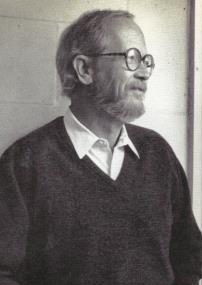
For those of us who discovered him as a writer, first of Westerns and then as ground-breaking crime novels, twenty-five years ago – mostly thanks to the evangelical work of Maxim Jakubowski at the Murder One bookshop – it was a mystery why he was not more of a household name in the UK if only among crime writers, or why it took until 2006 for him to win an award from the Crime Writers’ Association despite being named as “The Crime Writers Crime Writer” by both The Observer and The Guardian.
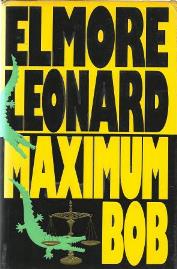 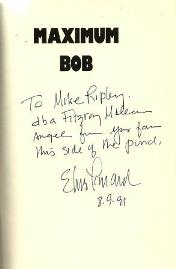
I shall always cherish my copy of Maximum Bob, which friends in Los Angeles bought me as a present after getting it signed by the author back in 1991. Now I happen to know, from my first meeting with Elmore at a signing session in London in 1988, that he patiently and carefully wrote whatever the customer wanted, so I have no illusions that the inscription To Mike Ripley a.k.a. Fitzroy Maclean Angel from your fan this side of the pond, Elmore Leonard was actually dictated to him by my friends. I cannot really believe that Elmore remembered me, or my series hero, though the fact that he wrote your fan (singular) hints that he knew my work.
I know he took note of reviews of his books and I was intensely proud when my review of one of his later books, in the Daily Telegraph, got prime billing on his website.
I must also mention, albeit belatedly, the death of Richard Matheson, a multi-talented writer of horror, science-fiction, fantasy, crime novels, thrillers and westerns, who die in June at the age of 87.
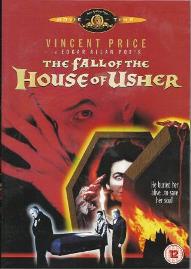 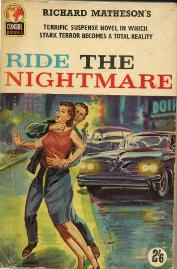
I first came to the work of Richard Matheson through his classic horror novels I Am Legend and The Legend of Hell House without realising he was also the author of The Incredible Shrinking Man and a prolific screenwriter for TV westerns and The Twilight Zone as well as the movie version of The Fall of the House of Usher (although perhaps we should gloss over that one).
Eee..books, as they say in Yorkshire
Those great supporters of crime fiction based in beautiful North Yorkshire, Magna Large Print, and parent company Ulverscroft based in Leicester, are in the process of establishing a secure e-book ‘platform’ only for public libraries. Authors with work already in e-book file format (can you tell that I’ve no real idea what I’m talking about?) and who own the rights, can fix a selling price to libraries and any royalties are shared equally with Magna. As I understand it, such an arrangement should not impinge on any existing platform deal selling to the general public. But please do not take my word on this (or anything else for that matter) and contact Diane Allen at Magna for proper details: diane.allen@magnaprint.co.uk
Death in a Cold Climate
Regular readers will know that my appetite for Nordic crime fiction is fairly insatiable. Such has been the profusion of Nordic crime in the past few years that surely by now every single member of the populations of the Scandinavian countries plus Iceland, Greenland and the Faroe Islands must have written one, or knitted a pullover for a television adaptation.
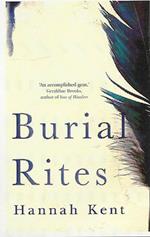

With the prospect of the supply well running dry I am therefore delighted to welcome the latest debutante to this chilly subset: Hannah Kent, who is frighteningly young, very talented and Australian. Burial Rites, published by Picador, is not your typically gloomy slice of Nordic Noir. True, there are not many laughs in it, but it is very powerful and it is set in Iceland in 1829, based on a real murder case which resulted in, I believe, the last person to be executed for murder there. (I suppose I should have yelled “Spoiler Alert!” at this point, but this excellent, atmospheric first novel is anything but a run-of-the mill whodunit.)
Leaning Tower of Books
On my return from Tuscany, having ironically flown in and out of Pisa, I discovered a leaning tower of books waiting for me at Ripster Hall, to which I have yet to do full justice but several are worth an immediate mention.
In truth, Bantam Press’ Behemoth thriller of the summer, I Am Pilgrim by screen-writer and film producer Terry Hayes, arrived before I left for Italy but I am afraid Ryanair have a peculiar attitude when it comes to registering a 700-page one kilo hardback as hand luggage. I will now set to it with a will.
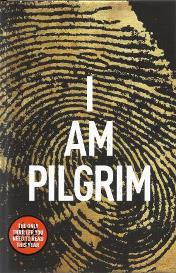
Two old favourites, I’m happy to say, will be making welcome returns in September: Kinsey Millhone and Sid Halley, who have two things in common – they are both private eyes and they are both well-rounded and well-established characters.
 
Kinsey Millhone, the female P.I. created a whole alphabet ago by Sue Grafton makes her 23rd appearance in W is for Wasted, from Mantle, whilst Sid Halley, the damaged but very resilient jockey-turned-investigator, was originally created by Dick Francis and continues his sleuthing career (though trying to retire) in Refusal by Dick’s son Felix Francis, from Michael Joseph.
And to insure my Christmas supplies of fermented Maple Syrup this year, I really must recommend How the Light Gets In by Louise Penny, Canada’s sexiest lumberjack and finest distiller of maple syrup.

The book, just out from Sphere, features her regular detective hero Inspector Armand Gamache and her regular setting of the small Quebec township of Three Pines. Anyone who thinks this is a series of cosy village mysteries, however, is wrong. In her latest, Penny shows that big time crime and outrageous political and legal corruption can be found not very far beneath the surface of even the most picturesque and tranquil setting. There is a real sense of drama and pace as the story reaches its climax and the scene in the penitentiary where Gamache (locked in a prison) realises what is going on is wonderfully tense and downright creepy.
And in the faint hope of finally being invited to one of the many red carpet film premieres of his books, I must – more in hope than expectation – point all who like their crime fiction with a twist of noir towards the new Jack Taylor novel Purgatory by that poet of human fecklessness Ken Bruen, which has been published by Transworld Ireland.

In the Jack Taylor television series, our doom-struck hero is played lyrically and almost romantically by that splendid actor Iain Glen. In Ken Bruen’s books, things are much sharper, more cutting. Bruen throws words on to the page in short, poetic bursts and then takes a jagged-edge implement to them. It is not a style to everyone’s taste, but you cannot ignore the angry energy and electricity in the writing.
Do mention the war
The Second World War continues to exert a hypnotic effect on thriller writers, which in a way is understandable as, put simplistically, it was a total, global war against a particularly evil enemy. As well as accepted classics of the genre (think Household, Maclean, Deighton, Higgins, Gardner, Forsyth et al), later generation of writers, all born after the war, have used the setting to good effect, for example: Robert Harris, Philip Kerr, Laura Wilson, Aly Monroe and John Lawton.
In publishing terms, the war rumbles on and Titan Books have just published the first two books in a new series by Maureen Jennings, who emigrated from the UK to Canada as a teenager.
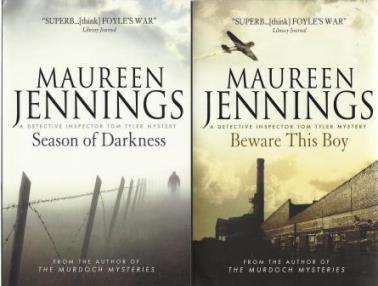
Featuring Shropshire police detective Tom Tyler, Season of Darkness and Beware the Boy are both set in 1940 and are clearly aimed at fans of Anthony Horowitz’s Foyle’s War. I wish them well, but establishing such a series will not be easy as writers such as Philip Kerr and John Lawton have set the bar so very high.
The Wrong King’s Speech
If you add the words ‘alternate history’ to a thriller description, stick a swastika on the cover and reference the House of Windsor in the title, most thriller readers would expect a cocktail of Robert Harris’ Fatherland and Jack Higgins’ To Catch A King. If they did, they would be disappointed in D.J. Taylor’s superb novel The Windsor Faction which is published by Chatto & Windus this month.
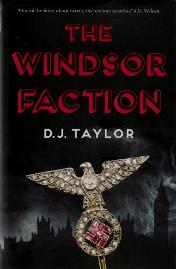
Now I’ll probably get into trouble saying this, but this isn’t really the “taught and gripping thriller” the publisher’s hype suggests it is. That is not to disparage the book, nor the – in my not-so-humble opinion – very noble descriptor ‘thriller’. The Windsor Faction does contain intrigue, treason, suspicion and a hint of spying, but in truth it is a novel not about a power struggle, but about powerlessness and the inertia which gripped Britain (or certain sections of it) in the ‘Phoney War’ in the Autumn and Winter of 1939-40. {Though to be picky, I think the term ‘Phoney War’ came later; at this time it was known in Britain as the ‘Bore War’.}
The ‘what if’ part of the plot is that, at the outbreak of war, King Edward VIII is on the throne but Wallis Simpson has (conveniently for many) died before provoking a marriage/abdication crisis. A ‘pacifist conspiracy’ (the ‘faction’ of the title) of intellectuals, politicians, pro-Germans and Nazi sympathisers starts to coalesce around the King, waiting for him to take the lead in peace negotiations with Hitler. The conspiracy comes to a head around the King’s Christmas broadcast on the BBC which is written for him by Beverley Nichols and the hunt for the membership lists of the Faction, which is based on the clandestine organisation The Right Club who used the letters P.J. (meaning ‘Perish Judah’) as a logo.
In fiction, King Edward VIII turns out to be as selfish and ineffective a monarch as he threatened to be in real life and since the death of Mrs Simpson has more or less isolated himself to concentrate on mourning her. It is this picture of a lethargic and moribund monarch which D.J. Taylor takes as his central image in his portrayal of a British political and intellectual elite stumbling (or perhaps sleepwalking) into a war which is going to change virtually all their belief systems. No character is particularly heroic, several are definitely damaged and all are listless or unsympathetic, which is perhaps not a bad description of the class-bound social order of the time.
Whilst not an ‘edge-of-the-seat’ thriller, The Windsor Faction is a fascinating, richly-textured segment of ‘alternative history’ – though perhaps not that much of an ‘alternative’ – written with such skill, and at times beauty, that the overall effect is hypnotic, thought-provoking and deeply satisfying. It is unlikely to be a contender for the Ian Fleming Steel Dagger Award, but it will be one of the best novels – one of the best pieces of writing – you’ll read this year.
|
|
Mann Delayed
To give my July column locum his due, Jake Kerridge did mention the splendid new novel by Jessica Mann, Dead Woman Walking, which should have been published by now by the small independent publisher Cornovia Press.

Like my young apprentice, I recommend the book most highly but have to report that publication has been unavoidably delayed. Do put this book on your Most Wanted list, though, as it will be worth your wait.
Can’t Keep Arthur Down
If WWII and the Nazis have provided a million plotlines for thriller writers, then the myth of King Arthur (not forgetting Excalibur and Camelot) has certainly provided thousands, proving you can’t keep a good myth down.
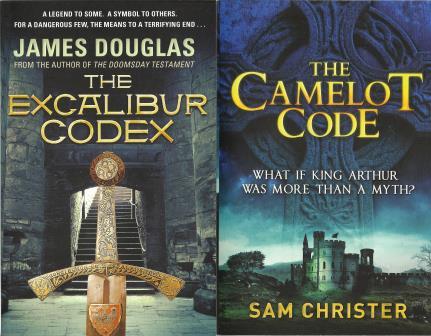
Two of the latest are The Excalibur* Codex (which also mentions Nazis) by James Douglas, which I believe is a pen-name for historical novelist Douglas Jackson, and The Camelot Code by Sam Christer, which I believe is a pen-name for Jon Trace, which in turn is a pen-name for Michael Morley.
{*For anyone remotely interested, I subscribe to the theory that the name ‘Excalibur’ is more accurately ‘Ex-Chalyber’ as chalybs was a Latin word for steel and the Chalybes were a tribe noted for their metalworking skills who lived in the ancient kingdom of Pontus in what is today Turkey. Just thought I’d mention that.}
Ostara Originals
I may have previously let slip – purely accidentally of course – that I am closely involved with another small, independent publisher, Ostara which has in a few short years established quite a reputation for reissuing great British crime novels, medieval mysteries, clerical crime novels and disgracefully-forgotten thrillers by authors such as Denise Danks, Lesley Grant-Adamson, Edward Marston, Brian Callison, Alan Williams, Victor Canning and Geoffrey Household.
Now there is a brand new imprint to be listed on Ostara’s website (www.ostarapublishing.co.uk), Ostara Originals.

As one of the leading print-on-demand publishers, producing trade paperbacks, ebooks and now hardbacks, Ostara Originals aim to do more or less exactly what the brand name suggests and publish new fiction by authors with proven track records. The first Ostara Original (or ‘001’ as I like to call it) is also a noted medieval mystery, in the form of the ninth William Falconer novel – Falconer being the Inspector Morse of 13th-century Oxford – by Ian Morson: Falconer and the Rain of Blood.
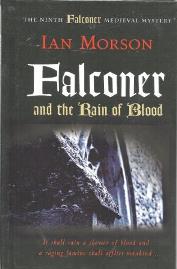
It is rumoured that Rain of Blood may well be the concluding instalment of the Falconer series, though authors should be wary of dispensing with good characters, for memorable new ones are not easy to create.
Spies of the Sixties
Wearing my Top Notch Thrillers’ editor’s hat (with its green eyeshade), I have much enjoyed the thrill of the chase when it came to tracking down authors and books from the days when British thriller writers were enjoying a golden age (1953-1978) and virtual global dominance.
One of my ‘targets’ for three years now has been that much-misunderstood icon of Britain in the Swinging Sixties, The Dolly Dolly Spy, written by the then 23-year-old Adam Diment, which caused quite a stir when published in 1967.
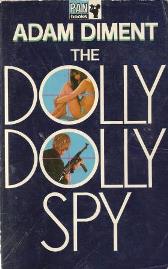
That book, along with two rapid follow-ups – The Bang Bang Girls and The Great Spy Race – featured the exploits of special agent Philip McAlpine, clearly conceived as a younger, dope-smoking James Bond, sensationalising and glamorising the myth of Carnaby Street fashion, fast cars and immoral youth, often to the ire of older crime fiction reviewers. There was even talk of a film version starring Sixties idol David Hemmings. More of a sensation was caused in 1972 when, after a fourth book, Think Inc, the high-profile young author suddenly dropped out of public view, and has remained so to this very day. There were rumours (unproved) that he was on the run from the taxman or the Treasury, that he had gone to India to seek enlightenment with a mystic, that he was in Thailand and involved in the drug scene, or (most likely) that he got fed up with the publishing hype, said ‘to hell with it’ and went into farming in Kent.
Despite appeals on the internet over several years, nothing of substance has been heard of or from Adam Diment for more than 40 years. His agent (and some say the mastermind behind the books), Desmond Elliott, died in 2003 and I have been unable to track down anyone who worked on Diment’s books or who might help me negotiate the re-publishing rights.
I continued to hope that I might turn up a clue as Dolly Dolly Spy is really quite a good thriller – very much in Gavin Lyall mode rather than Ian Fleming – and contains a diatribe by the hero on the state of post-Imperial Britain which would not have looked out of place in a John Le Carré novel. It has, along with its follow-ups, been unfairly credited as being the inspiration behind the Austin Powers movies, especially The Spy Who Shagged Me, but it would be sad if that was all it was remembered for.
Just as I was becoming resigned to never finding Adam Diment, I was given a telephone number –under strict conditions of secrecy in classic ‘Deep Throat’ style – which I was assured was Diment’s current location. As the number was for the Sevenoaks in Kent area, it tied in with my ‘most likely’ theory of what happened to him. Unfortunately, the number turned out to have been discontinued some time ago, so I think I must draw a line under the prospect of recruiting Adam Diment as a Top Notch Thriller author.
However, in thriller publishing, when one door closes another one is thrown open (and a man comes in holding a gun) and I am delighted to announce that the next two Top Notch Thrillers to appear, in October, will feature one of the legendary fictional spies of the Sixties: Callan.
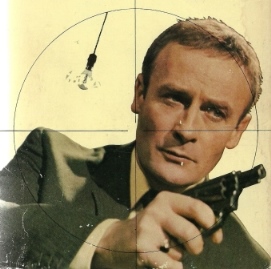
Created by James Mitchell in the television drama A Magnum for Schneider in 1967, the ferociously downbeat hit-man David Callan (the polar opposite of the ‘swinging’ Philip McAlpine) as played by Edward Woodward went on to become something of a national treasure in subsequent television series, which have recently appeared in DVD collections.
The Callan TV series and James Mitchell’s novels which followed, show the grim world of spies, double-agents, gangsters and petty crooks, stripped down to their brutal essentials. In many ways Callan was a very British hero and it is a pleasure to be able to bring James Mitchells’ novels A Magnum for Schneider (from 1969) and Russian Roulette (1973) to a new readership.
Unmasking Maxwell March
In July I was privileged to attend the 25th anniversary lunch of the Margery Allingham Society held in the wonderfully discreet surroundings of the Concert Artistes’ Association, a venue snuggled away from public view in the heart of London’s West End. It was a far cry from that early, formative gathering a quarter of a century ago when a group of dedicated Allingham fan braved the Essex winds to gather at Margery’s graveside in the village of Tolleshunt D’Arcy.
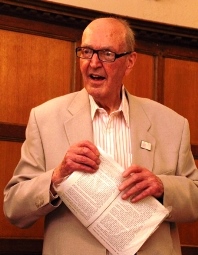
The luncheon was not only a pleasant social occasion but also informative, as Chairman Barry Pike (author of the definitive reference work on Allingham’s most famous detective novels Campion’s Career) lectured on the lesser-known, and long out-of-print, thrillers she wrote in the 1930s under the name Maxwell March.
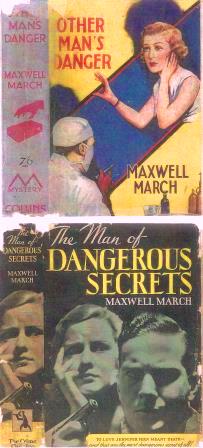
The Society has also had a splendid idea to extend its anniversary celebrations and is to sponsor a short story competition with a prize of £1,000 in conjunction with the Crime Writers Association.
And in other anniversary news…
To mark 25 years since its first publication, Arrow have produced a special edition of Thomas Harris’s infamous thriller The Silence of the Lambs which the publishers claim was ‘the book that launched a legend’ meaning, I think, the character of Dr Hannibal Lecter, although they seem to have forgotten Harris’ earlier book, the excellent Red Dragon.

Fascinatingly, the 25th Anniversary edition contains facsimiles of press cuttings of reviews of the book on first publication and there, quoted as admitting he could not put the book down, is none other than our own dear Professor Barry Forshaw, then a reviewer for that literary flagship, the Islington Gazette.
One 25th anniversary which went unnoticed in August (at least in this column whilst under caretaker management) was the publication of my first novel, Just Another Angel which appeared just in time to be sold on the shelves of the newly-opened Murder One bookshop in Denmark Street. Putting modesty aside (the best place for it) I am happy to report that my ‘Angel’ series has not been totally forgotten in this auspicious year and in particular has been celebrated in glowing and very generous terms by Evangeline Jennings on the ‘Fem Noir’ website http://pankhearst.wordpress.com/2013/03/07/flights-of-angels/ which is run by a collective of talented and disgracefully young writers.
 
After some rudimentary detective work (i.e. I asked her) to discover more about this obviously talented lady of excellent taste, I learned that Evangeline was born and brought up in Liverpool and has continued her hatred of Manchester United despite relocating to Texas, which I believe is one of those United States. She admits to being something of a black sheep in her family and is currently smuggling her British library of books piecemeal across the Atlantic. One of the first consignments to arrive, fortuitously for me, contained my ‘Angel’ novels and without threat or bribe, she decided to re-read them and post her judgements on the Pankhearst website.
An author in her own right, Evangeline cites punk rock and Larry Block as her key inspirations and her latest work has just appeared in the anthology Cars and Girls, which I am pretty sure has absolutely no connection to recent rumours about the television show Top Gear.
I am doubly blessed by the enterprise of Telos Books, who have reissued two of my Angel titles, from 1997 and 1999 respectively, That Angel Look and Bootlegged Angel, each with an authoritative specially-commissioned Introduction by…er…me.
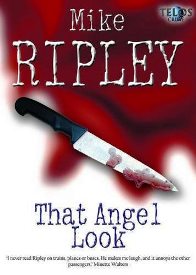 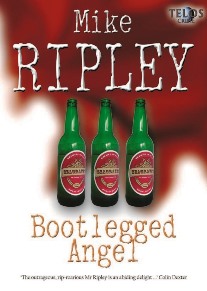
And talking of Introductions…
With great age comes great responsibility, and the great pleasure – in the world of crime fiction – of contributing Introductions to reissues of famous mysteries (sometimes for books which are not one’s own) as they are set before a new, younger, readership.
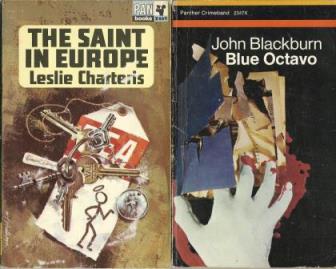
I am therefore delighted to have been asked to provide the Introductions for new editions of Leslie Charteris’ 1953 volume The Saint in Europe (coming from Mulholland Books in December) and for John Blackburn’s 1963 mystery set in the world of antiquarian books Blue Octavo, which is to be reissued by Valancourt Press in America.
Bodies
I have a note in my trusty Boy Scouts’ diary that there will be a Bodies in the Bookshop event in Cambridge on Saturday 14th September and that tickets are priced at £30, though as the event is no longer held in Heffers bookshop on Trinity Street (probably for inane Health and Safety Gone Mad reasons) I cannot guarantee that the entrance fee includes the once traditional complimentary magnum of domestic champagne. As I am unlikely to attend, partly for legal reasons and partly because the price seems high for an impecunious pensioner such as myself, I have no idea if any of this information is accurate but I am told that more sensible advice can be obtained by telephoning 01223 463220.
In the evening of 26th September, Goldsboro Books in Cecil Court, the hub of literary London, will host the third History in the Court event, the historical writing counterpoint to their fabulous Crime in the Court summer street parties.
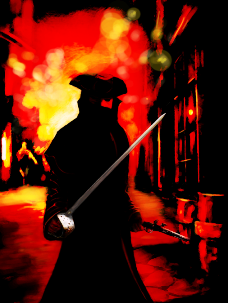
For further, more accurate, details, visit the Goldsboro website at www.goldsborobooks.com.
Those Walking Men
So far this year I have resisted, with teeth gritted, the urge to comment on the continued over-use by publishers of the ‘man-walking-away’ image (or slight variants thereof) on dust jackets. I can grind my molars no longer and I reproduce here a mere handful of images which have appeared over the past two months in the faint hope that publishers might be shamed into putting a bit more thought into their covers. I have honestly no recollection of which books they come from as so many such covers flash before my failing eyes each year. Goodness knows it must be confusing for the book-buying public.


It had To Happen
Those of you paying attention will remember that back in May I recounted the story of how Ian Rankin and I cooked up the idea for a murder mystery set on a 10th century Viking longship under sail in the middle of the North Atlantic and how Ian came up with the ideal detective to solve the case.
What a pity we never copyrighted the concept, or even bothered to jot it down on the back of a fag packet, because an experimental theatre group about to launch a national tour has picked up the idea and run with it…
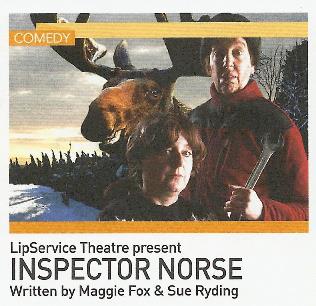
Pip! Pip!
The Ripster
|